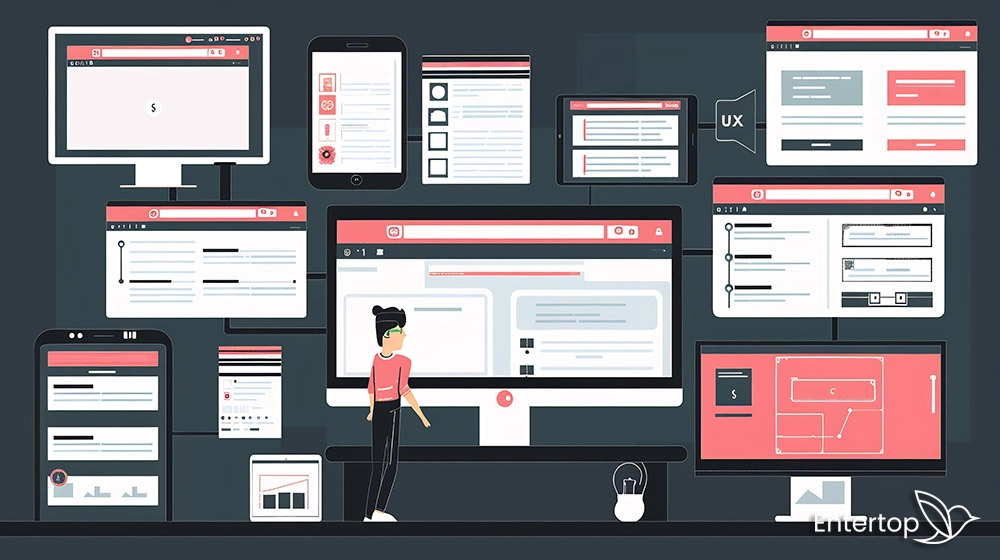How to Choose the Right Web Development Framework for Your Business
Choosing the Right Web Development Framework for Your Business in 2025
Selecting the right web development framework is like choosing the foundation for a skyscraper—it affects everything from site
speed to scalability, security, and long-term maintainability. For businesses launching or scaling their digital products in 2025, this decision has never been more strategic.
With countless options available—from robust back-end solutions to ultra-modern front-end libraries—the real challenge is not availability but suitability. Let’s walk through a step-by-step guide to help you choose the most aligned web framework for your goals.
1. Define Your Business Goals
Before comparing frameworks, clarify your business use case. Are you building a high-traffic eCommerce store, a scalable internal dashboard, or a content-driven landing page?
Project Types and Matching Frameworks:
- For scalable, long-term apps: Node.js, Django, Spring Boot
- For fast MVPs or startups: Laravel, Ruby on Rails
- For modern, dynamic interfaces: React, Vue
The more focused your product vision, the narrower your options become—making selection easier and smarter.

Sharing: Choosing the right web development framework is essential for achieving your business goals, and a professional web development company can help ensure the framework aligns perfectly with your specific needs and long-term success.
2. Front-End, Back-End, or Full-Stack?
Knowing whether you need a full-stack or separate front/back-end architecture is critical. Each model has its strengths:
Front-End Frameworks:
- React
- Vue
- Angular
Back-End Frameworks:
- Django (Python)
- Laravel (PHP)
- Express.js (Node.js)
Full-Stack Solutions:
- Next.js (React + SSR)
- Nuxt.js (Vue + SSR)
- Meteor
- ASP.NET Core
If your team prefers working with one integrated environment, go full-stack. For larger teams with distinct roles, separate front/back-end solutions might be more manageable.
3. Developer Experience & Learning Curve
The speed of development often depends on how familiar your team is with a framework. Some frameworks are intuitive and beginner-friendly, while others offer flexibility at the cost of complexity.
- React: Modular and powerful, but needs knowledge of bundlers like Webpack or Vite.
- Vue: Clean syntax and quick to learn—great for small to mid-sized teams.
- Django: Offers everything out-of-the-box, ideal for back-end developers.
- Laravel: Combines elegant syntax with a huge ecosystem of tools like Laravel Forge and Nova.
The more experienced your team is with a tech stack, the faster your time-to-market.
4. Performance and Scalability
Your framework choice must support your app's performance needs today and in the future.
Performance-Oriented Options:
- Spring Boot: Excellent for enterprise-grade systems and microservices.
- Express.js: Lightweight and ideal for APIs.
- Next.js: Delivers superior performance with built-in server-side rendering.
- FastAPI: A modern Python framework, known for blazing speed with async support.
Tip: Use tools like Google Lighthouse or GTmetrix to benchmark performance regularly during development.
5. Security and Stability
For any business-focused application, security must be a non-negotiable priority.
Secure Frameworks:
- Django: Includes built-in protection against XSS, CSRF, and SQL injection.
- Laravel: Offers built-in security features and community plugins.
- ASP.NET Core: Highly secure, backed by Microsoft.
- Express.js: Lightweight but needs middleware (Helmet.js, CORS) for hardening.
Always choose frameworks with long-term support, regular patching, and strong community backing.

6. Community and Ecosystem Support
A healthy developer community speeds up development, helps with troubleshooting, and ensures long-term sustainability.
Strong Communities:
- React & Angular: Massive adoption and corporate backing (Meta & Google)
- Django: Strong presence in the Python ecosystem
- Vue: Open-source favorite with exceptional documentation
Check GitHub stars, package availability (npm, PyPI, Composer), and Stack Overflow activity before committing.
7. Hosting & DevOps Integration
Your framework should play nicely with modern deployment tools and workflows.
- Next.js + Vercel, Nuxt.js + Netlify: Great for static and JAMstack sites
- Laravel + Forge, Django + Heroku: Ideal for back-end focused apps
- Spring Boot, ASP.NET Core: Compatible with enterprise hosting (AWS, Azure, GCP)
Modern CI/CD and containerization compatibility (Docker, GitHub Actions) is a must-have.
8. Real-World Use Cases by Framework
Let’s explore which companies are using what — and why.
| Framework | Best For | Used By |
|---|---|---|
| React | Interactive UI | Facebook, Netflix |
| Django | Secure, scalable backend | Instagram, Pinterest |
| Angular | Enterprise SPAs | Google, Deutsche Bank |
| Laravel | MVPs, SaaS platforms | Startups, SMEs |
| Spring Boot | Enterprise systems | Accenture, eBay |
9. Cost and Licensing
Most popular frameworks are open-source with permissive licenses (MIT, Apache 2.0), making them ideal for business use.
Cost Considerations:
- Avoid frameworks with restrictive commercial licenses.
- Confirm compliance if using in proprietary or commercial SaaS platforms.
For most teams, the real cost lies in development and maintenance—not the tools themselves.
Conclusion: Choose with Strategy, Not Hype
There’s no universal “best framework.” The right choice is the one that matches your team’s expertise, your project’s goals, and your business’s roadmap.
Look for frameworks that offer:
- Fast development
- Secure architecture
- Future scalability
- Rich ecosystem support
In 2025, success in web app development hinges on strategic decisions made early. Choose wisely now, and you’ll save time, money, and frustration later.
As a leading web design agency, Entertop stands out among web developers in Malaysia by crafting tailored web development frameworks that meet the unique needs of each industry, ensuring optimal performance and user experience.


